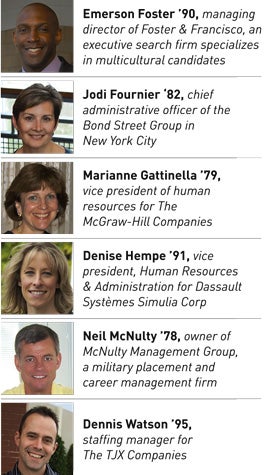Is Your Glass Half-full?
HR professionals offer advice to the unemployed
 First and foremost, these alumni offer hope. “The media hype about unemployment isn’t helpful,” says Hempe. “Even in states with 10 percent unemployment, 90 percent of the work force is employed.” Gattinella agrees. “Companies are still hiring, albeit at a reduced rate.”
First and foremost, these alumni offer hope. “The media hype about unemployment isn’t helpful,” says Hempe. “Even in states with 10 percent unemployment, 90 percent of the work force is employed.” Gattinella agrees. “Companies are still hiring, albeit at a reduced rate.”
To identify where these jobs exist, it’s critical to think creatively. “Don’t go where everyone else is going,” says McNulty. “Big companies are struggling, so look at ‘Joe’s Manufacturing.’ Some of the best opportunities are found in small, privately owned companies. Some industries, such as banking, may be hurting overall, but not every financial institution is doing badly. Consider regional banks.”
The federal government may also be a bright spot. In a strange twist of irony, these trying times are creating job openings. The Federal Deposit Insurance Corp. is hiring professionals with finance backgrounds to help manage bank failures across the country. The official job site of the federal government, usajobs.gov, lists more than 40,000 jobs nationwide in diverse fields.
The military is also a viable option for recent college graduates. Although the global war on terror rages on, McNulty says the benefits of joining the military far outweigh the risks. “You get tremendous experience, and even in a bad economy, corporations hire candidates who have served. Four years in the military is equivalent to earning a degree from a superb graduate school.”
Conversely, graduate school may give the unemployed a competitive edge, enabling them to emerge into an improving economy with an advanced degree. “Typically, I tell recent college graduates to work first before going to graduate school, but right now graduate school is one of the better places to be,” says Foster.
If graduate school is cost-prohibitive or unrealistic for job seekers who already have advanced degrees, then the job market is best navigated through networking, a job-hunting tool that many find intimidating. “People are scared to death of networking,” says McNulty.
“You have to have an appetite for it,” says Gattinella, “but it can be very effective if you’re organized in your approach. Make a targeted list of the companies you’d like to work for and the places you’re willing to move to. When contacting those who can help—fellow alumni, former co-workers, professional organizations—be succinct about your goals and capabilities. If you’re out there networking enough, you’ll start hearing the names of those you need to reach out to. Call them, state who referred you, and ask to meet personally. If that’s not possible, ask to spend 30 minutes on the phone.”
Recommendations cannot be underestimated. “Referrals have a higher probability of speaking to someone at a company,” says Watson. “Don’t be ashamed to ask for help,” says Hempe. “There’s no stigma attached to unemployment in this economy.”
| RhodyNet™
Career Services: career.uri.edu Graduates Networking Information |
If job offers remain elusive, Fournier suggests temporary work. “This year’s college graduates can gain valuable experience and observe the culture of the company. For older job seekers, temporary work provides prospective employers with the opportunity to get a feel for their work ethic and their quality of work.”
Temporary work is often obtained through a placement agency; experts highly recommend that avenue. “Even in today’s economy, companies are still using temps,” says Hempe. Placement firms can help job seekers write and edit résumés at no cost. Concise résumés that address how the job seeker’s skills can benefit a company are crucial to finding permanent employment. Fournier says that best practice is “one page for every 10 years of work, but no more than two pages in all.”
Watson recommends paying close attention to cover letters. “Companies recognize the standard cover letter where someone just inserts a company name, but the letter that includes details of why someone wants to work for the company combined with specific information about that company will get attention. Adding something specific about the position requirements and your experience makes the letter more personalized to the company and position. This is the key to a good cover letter.”
Most importantly, experts stress that maintaining a positive attitude is paramount to a job seeker’s success. McNulty says that job candidates should “hit a home run out of the stadium” during an interview; the only way to do that is to concentrate on a positive presentation and forget the headlines.
Job seekers cannot control the news reports, but they can look closely at the numbers. The Labor Department reported that job losses trended downward in the spring.
Experts stress that figures should not drive the job hunting process. Instead, they recommend that those searching for employment maintain a “glass half-full” perspective, heed the advice offered here, and keep a laser-sharp focus on where they can apply their skills best in this changing economy.
– Maria V. Caliri ’86, M.B.A. ‘92
 Home
Home Browse
Browse Close
Close Events
Events Maps
Maps Email
Email Brightspace
Brightspace eCampus
eCampus


